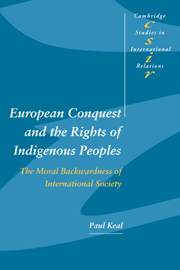 European Conquest and the Rights of Indigenous Peoples
European Conquest and the Rights of Indigenous Peoples Book contents
- Frontmatter
- Contents
- Acknowledgements
- Introduction
- 1 Bringing ‘peoples’ into international society
- 2 Wild ‘men’ and other tales
- 3 Dispossession and the purposes of international law
- 4 Recovering rights: land, self-determination and sovereignty
- 5 The political and moral legacy of conquest
- 6 Dealing with difference
- Conclusion
- Appendix
- Select bibliography
- Index
- CAMBRIDGE STUDIES IN INTERNATIONAL RELATIONS
5 - The political and moral legacy of conquest
Published online by Cambridge University Press: 03 December 2009
- Frontmatter
- Contents
- Acknowledgements
- Introduction
- 1 Bringing ‘peoples’ into international society
- 2 Wild ‘men’ and other tales
- 3 Dispossession and the purposes of international law
- 4 Recovering rights: land, self-determination and sovereignty
- 5 The political and moral legacy of conquest
- 6 Dealing with difference
- Conclusion
- Appendix
- Select bibliography
- Index
- CAMBRIDGE STUDIES IN INTERNATIONAL RELATIONS
Summary
The preceding chapters have successively discussed European representations of non-Europeans, the way first nations were dispossessed of their property, and the struggle to have rights to land and self-determination restored to them. This chapter concerns some political and moral issues arising from European conquest. In relation to the preceding chapters three clusters of problems stand out as the most important: the ethics of constructing ‘others’; the idea that ‘the West’ bears a collective responsibility for historic injustices that need to be redressed; the moral legitimacy of states with significant unresolved issues affecting their indigenous populations, leading in turn to the question of whether international society is legitimate. The underlying premise of the chapter is that if international society is to be regarded as worth preserving, either as an idea or in practice, then it must be a society that defends the whole community of humankind and not just the particular interests of dominant groups in particular states. This harks back to the suggestion in Chapter 2 that international society has a universal moral basis so long as it fosters the well-being of individuals everywhere, which is an argument that will be revisited in Chapter 6.
This chapter is arranged in three parts corresponding with the issues mentioned above. The first discusses the harms that can result from constructing others and which extend beyond colonial pasts and indigenous peoples to contemporary cross-civilisational relations in general.
- Type
- Chapter
- Information
- European Conquest and the Rights of Indigenous PeoplesThe Moral Backwardness of International Society, pp. 156 - 184Publisher: Cambridge University PressPrint publication year: 2003


